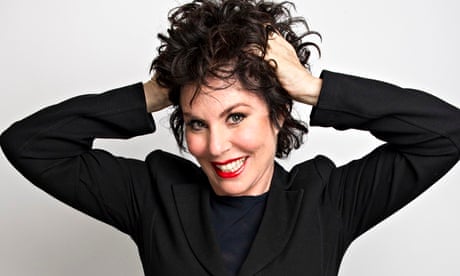Since getting a master's in mindfulness-based cognitive therapy at Oxford, Ruby Wax has been more interested in the cerebrum than celebrity culture. She is now a self-described poster girl for mental illness; in her new book, Sane New World, and its accompanying one-woman show, she aims to explain the brain and "tame the mind". She says it all started with a Comic Relief campaign against mental health discrimination.
When did you decide to tackle mental health issues in comedy?
I only did it because Comic Relief put a poster of me in tube stations. I usually say that it said, "This woman has a mental illness – please help her." But it turns out to be even worse. It said, "One in five people have dandruff. One in four people have mental health problems. I've had both." And that was in every tube station. I was horrified. I was so shocked that I started to write a show. And then I performed it – only in mental institutions.
How did you find writing such a show?
Writing comedy is a whole different bag. It's like with my book. You have to write the serious show and then you have to spin it into comedy. And that's what I can do: I'm not an academic but I can spin.
You hadn't spoken about your mental health problems before that.
No. I wouldn't tell anybody. It was really shaming. Especially if you're doing all right – people think you're being self-indulgent. Especially if you're working in show business. And I was scared. You'd get fired if people knew you had a mental disease.
You describe depression as a taboo. When will the situation change?
It's changed since I've been doing the shows. I'm asked to talk at Downing Street. I filmed people in parliament coming out and saying they had depression. I think it's going to become the next thing – I can feel it. Obama said this is the decade of the brain.
Bill Oddie suggested last year that celebrities are not best placed to talk about depression because their experiences are not comparable to those of everyday people …
Give me a break. Talk about using your celebrity … Who's he helping by saying that? Besides Bill Oddie? How else are you going to change the laws? Look at Richard Curtis: how else would £100m have been made for Africa? It's a shame that it isn't orthodontists that can raise that kind of attention but it doesn't happen.
What were the reactions like the first time you performed material about depression?
The first show was called Live from the Priory. I invited my friends – a lot of them were in show business, and the other half were inmates. It was hilarious. The inmates were so delighted that someone was speaking their language. And then there were people like Ian McKellen. The two worlds were mixing. So that was kind of thrilling. I didn't know if it would work. But then I took it for two years to different national health institutes. And I played Bedlam [Bethlem Royal hospital] – not many can say that.
The show was really well exercised by the time it went public. By that time, everyone in the audience was talking – the not mentally ill, the mentally ill, mothers who thought they'd passed their mental illness on to their children. We had no place to discuss this … There was a night a week when I wasn't performing and I was able to say to the public, "You can come in, free, and I'll bring you experts. And then you can ask questions … What do you say to someone on medication? Is the medication dangerous?"
And you began to hold Q&As after the show?
One thing led to another. I feel like I paid [the audience] back for allowing me to be a showoff for an hour and a half. I sort of say, "Over to you."
Now that there is a deeper sense of purpose to your comedy material, what can you see yourself doing in five years' time?
I've already put forward a book about our ancient whispers - you know, what we got from evolution but we don't even know about … I'll probably go back to Oxford and study evolution.
What should audiences expect from the Sane New World show?
People say they're surprised because they thought it would just be standup comedy. But it's funny and it's informative and I give you the answers. All for the price of a ticket. And I'll meet you after the show. Because I do – I go out after the show. I love talking to people. I'm walking them through the book but I've made it theatrical.

Comments (…)
Sign in or create your Guardian account to join the discussion